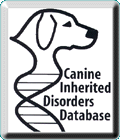
Myotonia
This disease affects skeletal (voluntary) muscle, such as the muscles of the limbs. Muscles are unable to relax normally following contraction (or electrical stimulation). This results in a stiff, awkward gait, difficulty in rising, and stiff joints.
In chow chows, myotonia is believed to be inherited as an autosomal recessive trait.
While there is no cure for this disease, affected dogs will often remain stable, without worsening of clinical signs, with drug therapy.
Your veterinarian will suspect this disease if your dog shows the characteristic signs of delayed muscle relaxation. Your dog may have difficulty rising, and a stiff gait (although gait will become more normal as the dog ‘warms up’). Muscles may be hypertophied (large and well-developed) and it may be difficult to flex the limbs. Diagnosis is confirmed by analyzing muscle response to electrical stimulation (electromyography) and by evaluation of muscle biopsies.
There is no cure for this disease, although drug therapy (eg. procainamide) helps many dogs.
Affected dogs should not be bred. Parents of affected chow chows are carriers, and siblings are suspect carriers, and so should not be used for breeding.
FOR MORE INFORMATION ABOUT THIS DISORDER, PLEASE SEE YOUR VETERINARIAN.
- Disorder Type:

